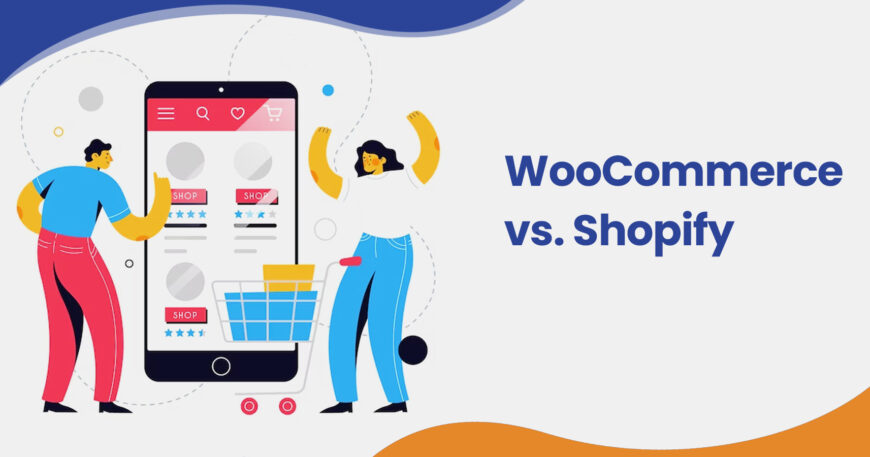It can be challenging to choose an e-commerce platform because there are so many possibilities, and each forum has its plus and minus points. You can make an informed conclusion with proper investigation and analysis of these platforms.
In this blog, we’ll compare and contrast Shopify and WooCommerce, two well-known e-commerce platforms, and assess them using seven criteria. This blog will cover ease of use, marketing tools and SEO, scalability and growth, build time, payment methods, security, and price.
With the opinions of Shopify and WooCommerce experts, choosing the best platform for your e-commerce firm will now become easier.
Shopify versus WooCommerce: Comparing Software Cores
Shopify and WooCommerce experts will tell you that these e-commerce systems are different at their core. Because Shopify is a closed system, they control what you can and cannot do once you sign up for their services. Shopify defines the regulations, and they have the authority to eject you from their system. But Shopify is a successful business that has spent a lot of money expanding the possibilities of its platform. Shopify is the largest e-commerce platform by market share because it powers 29% of American e-commerce sites.
In contrast, WooCommerce is an open-source framework based on the WordPress platform, and you may use WooCommerce experts to customize your store in any way you like. Your store may continue to operate even if the WooCommerce company goes out of business. Most American e-commerce sites use WooCommerce, while WordPress is the most widely preferred and used content management system online.
1. Ease of Use and Functionality
In this part, we’ll contrast the capabilities and usability of Shopify versus WooCommerce.
- Design: Shopify is the undisputed victor in terms of design if you want a store that looks fantastic right out of the box. Shopify website designers can further personalize free and premium themes on Shopify’s Theme Store using HTML and CSS editing tools.
Contrarily, WooCommerce provides significantly more possibilities with a wide selection of articles from their Theme Store, independent developers, and third-party websites like ThemeForest. Making your store appear suitable could take extra time and help from WooCommerce experts, given the wide variety of options available.
- Functionality: Shopify website designers and WooCommerce experts can integrate features like order tracking, referral schemes, email marketing, and fulfillment into their platform. You can find thousands of apps in Shopify’s App Store for any integration, but they are also typically more expensive than their WooCommerce counterparts.
On the other hand, you may add thousands of third-party extensions to your store, and WooCommerce also has its extension store. It’s vital to remember, though, that WooCommerce plug-ins aren’t reviewed and authorized like Shopify apps. Thus, incompatibilities or out-of-date plug-ins may necessitate you to take the help of WooCommerce experts. They will verify the compatibility of the plug-ins with the rest of your site.
- Support: You may contact Shopify’s support team via live chat, phone, and also by email at any time of the day or night. Additionally, they feature a lively community forum where users may post queries and receive responses from other users.
WooCommerce, on the other hand, lacks a centralized support staff due to its open-source design and lack of subscription costs. Users are left to come up with their solutions, whether working with a WooCommerce expert or turning to the WooCommerce community for assistance. The WooCommerce community is helpful and active, but it could be harder to locate the correct help compared to Shopify’s centralized support system. In general, Shopify’s support system is more robust and dependable, making it a superior option for people who value usability and prompt issue resolution.
2. Marketing Tools and SEO-Friendliness
After building a store, you must draw customers to an online store, though. With live chat, email, and phone help available around the clock, Shopify has a robust support infrastructure. Additionally, there is a thriving community forum. WooCommerce, on the other hand, depends on the community for help or hiring a WooCommerce expert to resolve any issues because it is an open-source product.
However, WooCommerce is a highly SEO-friendly platform because of its adaptability and WordPress compatibility. It gives you more freedom in creating a content area for blogs and knowledge bases. Although Shopify’s built-in content capabilities are not so robust, they are attempting to improve them. Shopify website designers and WooCommerce experts can only build your store. The success of an online store ultimately rests on its marketing plan and attempts to draw in customers.
3. Scalability and Growth of Your Platform
Shopify has a benefit in terms of expansion and scalability. Shopify designed its platform to handle high levels of traffic and transactions. You can quickly upgrade to more sophisticated plans with a greater capacity if you’re ready to pay for them. However, even Shopify can encounter problems with excessive traffic.
WooCommerce, on the other hand, gives you total control over your hosting and expenses and lets you upgrade whenever you like. It is in line with the WooCommerce philosophy, which allows you to update and alter the various components of your store as necessary. WooCommerce is the better option if you’re searching for a platform where you have total control over the scalability and growth of your store.
4. Build Time and Maintenance
There are definite differences between the time required by Shopify and WooCommerce experts to create an online store. You can set up a primary WooCommerce store in maybe 15 minutes, but it won’t look amazing. In contrast, setting up a Shopify store by Shopify website designers could take one to two months, mainly if you’re customizing the theme’s design and coding.
WooCommerce site’s regular maintenance can take longer because more complexity and troubleshooting are required, and you may need WooCommerce experts for that. Contrarily, because Shopify is a closed system that the firm carefully controls, it is considerably simpler to set up a functional e-commerce platform swiftly. Shopify is the undisputed victor in terms of build time and ongoing maintenance.
5. Payment Provider Options
Both Shopify website designers and WooCommerce experts can include a variety of connectors for various payment options, including Splitpay, Apple Pay, and Google Pay. They are simple to set up. When it comes to price, however, using Shopify might get expensive.
In addition to charging a transaction fee on every sale, even if you don’t use Shopify as the payment processor, add-ons for the platform tend to be more expensive than WooCommerce equivalents. As you upgrade to more expensive packages, the transaction costs go less, but the price can still be hefty.
In contrast, for a WooCommerce business, the only payment processor cost you’ll have to pay is the one levied by your payment processor. WooCommerce is generally the more affordable choice. It’s challenging to predict a victor in this category, though, because both platforms have unique opportunities.
6. Pricing Strategy
The pricing point is a crucial consideration when comparing Shopify with WooCommerce. Customers must pay for the security, assistance, and simplicity of use provided by Shopify’s closed system. WooCommerce, in contrast, gives users the freedom to design, enhance, and advertise their online stores, but you must also consider the fees of WooCommerce experts.
Conclusion
The decision between Shopify and WooCommerce ultimately comes down to what aspects matter the most to you. Shopify provides a closed system, user-friendliness, and support but at a cost and with less autonomy. WooCommerce, on the other hand, offers greater control and flexibility but necessitates more technical knowledge and probably work by WooCommerce experts. Both Shopify and WooCommerce experts can use options from a selection of integrations and payment options.
The success of your online shop will depend on how well you use the platform you choose, market your products, and give your consumers value. It is, therefore, crucial to pick an e-commerce platform that meets your demands and makes the most of it. If you need assistance with your online store, Vserve has a team of Shopify web designers and WooCommerce experts who specialize in e-commerce store optimization and promotion.
The video ‘Shopify vs. WooCommerce – Which Is The Best One for You?’ by ‘Exposure Ninja’ inspired this blog.





